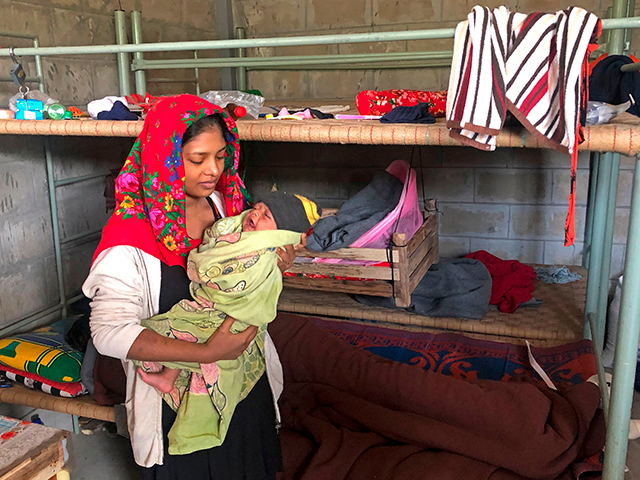The Bangladesh Navy on Tuesday shipped nearly 2,000 Rohingya refugees to a remote, flood-prone island that surfaced just 20 years ago in the Bay of Bengal.
Bangladesh government authorities moved roughly 1,800 refugees from Cox’s Bazar – the world’s largest refugee camp, located on the country’s southeast coast – to the island of Bhasan Char, located 21 miles from mainland Bangladesh.
“Refugees in five ships were seen sitting on wooden benches, some clutching ducks, pigeons and chickens in bamboo baskets,” Sky News reported on December 29 of the transfer.
Tuesday’s group was the second batch of refugees sent to the island this month. The Bangladesh Navy first shipped a group of 1,642 Rohingya to Bhasan Char on December 4.
Bangladesh’s government recently built new facilities on the previously uninhabited island to accommodate 100,000 people. The additions include an “eight-mile flood embankment and offshore breakwater structures,” according to Sky News. Government officials say the flood protections have made the island safe for its new inhabitants.
The United Nations says that the Bangladesh government barred the international organization from carrying out an assessment of the safety risks on Bhasan Char, meaning the government’s safety claims have yet to be independently validated. The international organization has further urged the Bangladeshi government not to pressure Rohingya refugees to move to the island, which Dhaka has denied doing.
Bangladeshi Foreign Minister AK Abdul Momen recently described the new government housing blocks on Bhasan Char as a “beautiful resort.”
The South Asian nation plans to eventually relocate 100,000 Rohingya to the island in an effort to decongest the Cox’s Bazar refugee camp, which houses an estimated one million displaced people. The Bangladeshi government has spent at least $112 million preparing Bhasan Char for the arrival of the refugees, building houses, hospitals, and mosques for the Muslim Rohingya.
Roughly 730,000 Rohingya fled Buddhist-majority Myanmar for neighboring Bangladesh in 2017. The exodus came shortly after Myanmar’s military cracked down on the Muslim minority group in its western region. Government authorities in Bangladesh tried to repatriate Rohingya refugees to Myanmar in 2018 and 2019 under a bilateral agreement between the two neighboring countries, but the refugees refused to return to Myanmar on both occasions. This has forced Dhaka to turn to alternative methods to alleviate pressure on its overcrowded Rohingya refugee camp in Cox’s Bazaar, such as the ongoing Bhasan Char project.
The United Nations has described the Myanmar military crackdown on Rohingya in 2017 as having been carried out with “genocidal intent.”

COMMENTS
Please let us know if you're having issues with commenting.